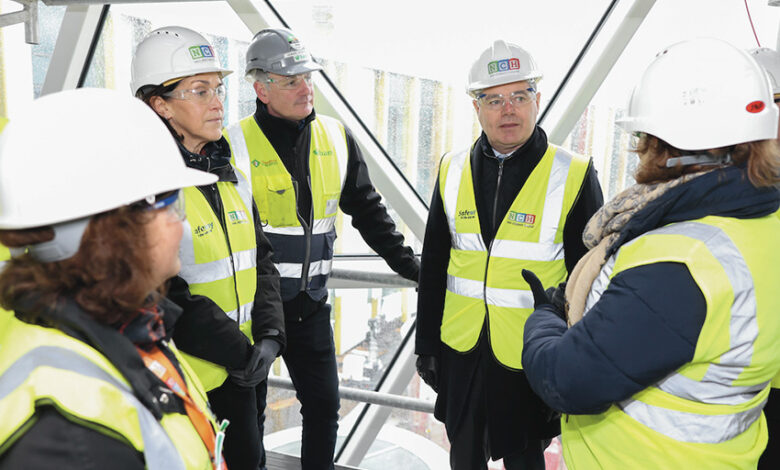Minister Paschal Donohoe TD: ‘Construction sector productivity vital to infrastructure delivery’

It has been a little over a year since the Government published the National Development Plan (NDP) 2021-2030, detailing a positive vision for Ireland, which delivers total public investment of €165 billion over the next 10 years. This puts Ireland’s capital investment amongst the largest across the EU. The NDP also sets out the range of actions that are being taken to strengthen delivery and maximise value for money. Minister for Public Expenditure, NDP Delivery and Reform, Paschal Donohoe TD, writes.
In 2023, over €12 billion will be made available from the Exchequer for investment in public capital projects, providing more schools, homes, hospitals, and other vital infrastructure. -However, the ambitious infrastructure plans of the NDP and the funding supporting its delivery can only be realised by ensuring that the construction industry has sufficient capacity and the necessary skills. This remains a key priority for me and the Government.
Market context
I am acutely aware of the challenges that the construction industry has faced over the last two years in terms of material price inflation and supply chain disruption. In order to safeguard the delivery of key NDP projects, in January 2022, my department introduced measures to address inflation for new contracts and tenders. Furthermore, in May 2022, a new set of measures to apportion additional inflation costs between the parties to public works contracts were introduced.
Commencements and the Planning and Development Bill
In 2022, almost 30,000 new dwellings were completed, an increase of approximately 45 percent in 2021. This is a positive sign of progress in the residential construction sector. Indeed, in the same year, approximately 40,000 planning permissions for homes were granted in the 12 months to Q3 2022. Overall, 2022 saw the second highest total number of homes commenced in a year since 2014, at almost 27,000.
“Now is the time to innovate and increase productivity of the construction sector in order to deliver key infrastructure.”
An efficient planning system is pivotal to the delivery of the NDP. The Department of Housing, Local Government and Heritage has recently published the Planning and Development Bill. This is the most comprehensive review of the Planning Act since it was enacted in 2000. The Bill, if enacted, will bring greater clarity, consistency, and certainty to planning decisions. Amongst the changes are statutory mandatory timelines for An Bord Pleanála decisions, and various steps in the judicial review system.
Reforms to the CWMF
An ongoing review of the Capital Works Management Framework (CWMF) is being undertaken by the Office of Government Procurement. Amongst other elements, the review will look at means to measure the performance of a project and its key actors during its delivery and beyond into its operation and maintenance.
Construction Sector Subgroup’s seven actions
The public and private sectors continue to collaborate in terms of reforms to support more efficient and sustainable delivery of key infrastructure. The Construction Sector Group, under my department, and its associated Innovation and Digital Adoption Sub-Group, are driving seven actions, with tangible evidence of progress noted.
Construct Innovate, with funding of €5 million, will be at the forefront to meet the demands of projects outlined in Project Ireland 2040. The research Centre will help Irish construction companies to develop competitive advantage, using cutting edge products and services that are more efficient, more environmentally sustainable, and more effective for their customers. The consortium consists of experts from University of Galway along with Trinity College Dublin, University College Dublin, and University College Cork, working with the Irish Green Building Council, and construction companies.
We understand that modern methods of construction (MMC) cuts across a number of different sectors and requires a whole-of-government approach. With this in mind, the Department of Enterprise, Trade and Employment has established a MMC Leadership and Integration Group to broader MMC development. In addition to this, the Construction Industry Federation has published reports to guide the development of MMC. Furthermore, planning and design work is proceeding of the Demonstration Park for MMC at Mount Lucas which will be operational from Q4 2023.
The LGMA, under the governance of the CSG Sub-Group has rolled out an e-planning system in 12 local authorities (LAs) in 2022. The rollout to the remaining LAs will occur throughout the rest of 2023, with the project aiming to successfully conclude towards the end of the year.
The Build Digital Project, with funding of €2.5 million from my department, will increase digital adoption and thereby increase productivity and innovation. This project aims to embed the use of digitalisation in many areas such as procurement, sustainability, and standards by enhancing the skills of the workforce and focusing on driving a cultural change to realise the full potential of digitalisation.
A Construction Sector Circular Economy Roadmap is being written by the Royal Institute of the Architects of Ireland (RIAI) and the Department of the Environment, Climate and Communications. This report, set to be published in Q4 2023, will offer guidance on best practice for the reduction of waste from construction and demolition projects.
Building capacity and critical skills
It is crucial that the construction sector, which as approximately 171,000 workers currently, has the necessary skills to produce the high-quality output. In 2022, there were approximately 1,700 construction apprentices registered, and a total of approximately 4,800 apprentices when including engineering and electrical. In order to increase the efficiency and effectiveness of these apprenticeships, the Department of Further and Higher Education, Research, Innovation and Science launched the National Apprenticeship Alliance (NAA) in early 2022. The NAA has many functions, of which the development of new apprenticeships is one.
In addition to the increase in apprentices, an increase from 793 in 2021 to a record 2,034 in 2022 was noted in the number of participants in the retrofit upskilling programmes. Along with this, the 2022 retrofitting target of 27,000 homes was met, and the target for 2023 has increased to 37,000 homes.
Conclusion
Now is the time to innovate and increase productivity of the construction sector in order to deliver key infrastructure. The Government will continue to foster innovation and digital adoption to support increased productivity, and a more efficient and sustainable sector.





